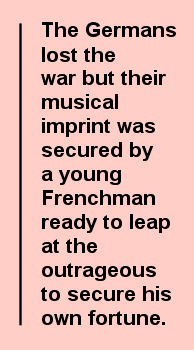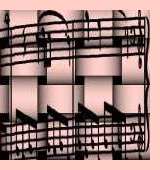



Boulez is Dead
<< Continued from page 1
 Beyond this the polemic is simply sheer nastiness in a very cold and calculated mode. Schoenberg's forms are only the foil and of little consequence in Boulez's overall game. They are a detail. It is with no little irony that serial music came to France from Germanic peoples. Schoenberg proclaimed 'German music would maintain world supremacy during the next century.' Boulez jammed that incredible galling knife in the side of his countrymen and himself immediately after the devastation of World War II. Though the Germans had lost the war, their musical imprint was secured through the hands of a young Frenchman ready to leap at the outrageous to secure his own fortune. Elsewhere Boulez confesses, 'I know I'm Germanic in this respect because I find sensual pleasure only a rather limited part of music.' For once Boulez is consistent: he detests the French and the Germans equally. The man knew how to create a good scandal. Beyond this the polemic is simply sheer nastiness in a very cold and calculated mode. Schoenberg's forms are only the foil and of little consequence in Boulez's overall game. They are a detail. It is with no little irony that serial music came to France from Germanic peoples. Schoenberg proclaimed 'German music would maintain world supremacy during the next century.' Boulez jammed that incredible galling knife in the side of his countrymen and himself immediately after the devastation of World War II. Though the Germans had lost the war, their musical imprint was secured through the hands of a young Frenchman ready to leap at the outrageous to secure his own fortune. Elsewhere Boulez confesses, 'I know I'm Germanic in this respect because I find sensual pleasure only a rather limited part of music.' For once Boulez is consistent: he detests the French and the Germans equally. The man knew how to create a good scandal.
Older composers often continue to write music of older styles, though there are notable exceptions such as John Cage or Stravinsky who climbed on the serial band wagon at the end of his career (according to a friend, Constance Trimble, who was present at Virgil Thomson's Chelsea Hotel suite in 1952, Stravinsky and Boulez argued passionately about serial music during the entire party; the serial works of Stravinsky followed -- Boulez can be very persuasive). Otherwise, examples of stylistic overlaps between generations are typical: Bach with the Rococo, Haydn with the early Romantic, Brahms with the nascent Impressionist. As such, Boulez's own words regarding Schoenberg now aptly apply to himself:
- Paradoxically enough, though Schoenberg's [Boulez's] work is essentially experimental, it lacks ambition; or if you like we can put it another way by saying that he pursues his experimentation with unyielding ambition, but in terms of a worn-out code. As a result of this contradiction our attitude to his music is full of reservations, more or less conscious, more or less intense...
 Turning to
Boulez the conductor we note his drive for dominance and worldwide recognition. Bernstein and Boulez, both extremely talented musical personalities, each possessed a force of will that demanded preeminence. But their drive for dual careers disrupted and essentially disqualified any hopes they might have had of being a singular compositional voice for their generations, of rising to the status of a Stravinsky or even a Schoenberg. Ironically their egos impeded their work as composers. They chose the glamour of conducting and interpretation over their own unique compositional voices. A creative artist may frequently find excuses, and these were world class excuses, not to make work. It became 'worthwhile' to block out the intense difficulty of continually confronting the daunting creative act. Confronting the compositional 'flaws' of others is easier for Boulez the conductor. He has no difficulty performing Schoenberg's work, though earlier, to lift himself, he had cast aspersions on Schoenberg by determining that 'stereotyped clichés abound with Schoenberg... there are the poor, and even ugly, rhythms...' Turning to
Boulez the conductor we note his drive for dominance and worldwide recognition. Bernstein and Boulez, both extremely talented musical personalities, each possessed a force of will that demanded preeminence. But their drive for dual careers disrupted and essentially disqualified any hopes they might have had of being a singular compositional voice for their generations, of rising to the status of a Stravinsky or even a Schoenberg. Ironically their egos impeded their work as composers. They chose the glamour of conducting and interpretation over their own unique compositional voices. A creative artist may frequently find excuses, and these were world class excuses, not to make work. It became 'worthwhile' to block out the intense difficulty of continually confronting the daunting creative act. Confronting the compositional 'flaws' of others is easier for Boulez the conductor. He has no difficulty performing Schoenberg's work, though earlier, to lift himself, he had cast aspersions on Schoenberg by determining that 'stereotyped clichés abound with Schoenberg... there are the poor, and even ugly, rhythms...'
Continue >>
Copyright © 25 March 2000 Jeff Talman, New York City, USA

<<Music
& Vision home
Past
eMuse features >>
|


 Beyond this the polemic is simply sheer nastiness in a very cold and calculated mode. Schoenberg's forms are only the foil and of little consequence in Boulez's overall game. They are a detail. It is with no little irony that serial music came to France from Germanic peoples. Schoenberg proclaimed 'German music would maintain world supremacy during the next century.' Boulez jammed that incredible galling knife in the side of his countrymen and himself immediately after the devastation of World War II. Though the Germans had lost the war, their musical imprint was secured through the hands of a young Frenchman ready to leap at the outrageous to secure his own fortune. Elsewhere Boulez confesses, 'I know I'm Germanic in this respect because I find sensual pleasure only a rather limited part of music.' For once Boulez is consistent: he detests the French and the Germans equally. The man knew how to create a good scandal.
Beyond this the polemic is simply sheer nastiness in a very cold and calculated mode. Schoenberg's forms are only the foil and of little consequence in Boulez's overall game. They are a detail. It is with no little irony that serial music came to France from Germanic peoples. Schoenberg proclaimed 'German music would maintain world supremacy during the next century.' Boulez jammed that incredible galling knife in the side of his countrymen and himself immediately after the devastation of World War II. Though the Germans had lost the war, their musical imprint was secured through the hands of a young Frenchman ready to leap at the outrageous to secure his own fortune. Elsewhere Boulez confesses, 'I know I'm Germanic in this respect because I find sensual pleasure only a rather limited part of music.' For once Boulez is consistent: he detests the French and the Germans equally. The man knew how to create a good scandal. Turning to
Boulez the conductor we note his drive for dominance and worldwide recognition. Bernstein and Boulez, both extremely talented musical personalities, each possessed a force of will that demanded preeminence. But their drive for dual careers disrupted and essentially disqualified any hopes they might have had of being a singular compositional voice for their generations, of rising to the status of a Stravinsky or even a Schoenberg. Ironically their egos impeded their work as composers. They chose the glamour of conducting and interpretation over their own unique compositional voices. A creative artist may frequently find excuses, and these were world class excuses, not to make work. It became 'worthwhile' to block out the intense difficulty of continually confronting the daunting creative act. Confronting the compositional 'flaws' of others is easier for Boulez the conductor. He has no difficulty performing Schoenberg's work, though earlier, to lift himself, he had cast aspersions on Schoenberg by determining that 'stereotyped clichés abound with Schoenberg... there are the poor, and even ugly, rhythms...'
Turning to
Boulez the conductor we note his drive for dominance and worldwide recognition. Bernstein and Boulez, both extremely talented musical personalities, each possessed a force of will that demanded preeminence. But their drive for dual careers disrupted and essentially disqualified any hopes they might have had of being a singular compositional voice for their generations, of rising to the status of a Stravinsky or even a Schoenberg. Ironically their egos impeded their work as composers. They chose the glamour of conducting and interpretation over their own unique compositional voices. A creative artist may frequently find excuses, and these were world class excuses, not to make work. It became 'worthwhile' to block out the intense difficulty of continually confronting the daunting creative act. Confronting the compositional 'flaws' of others is easier for Boulez the conductor. He has no difficulty performing Schoenberg's work, though earlier, to lift himself, he had cast aspersions on Schoenberg by determining that 'stereotyped clichés abound with Schoenberg... there are the poor, and even ugly, rhythms...'